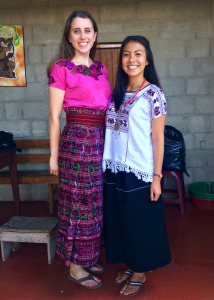During her summer as an intern for Ati't Ala', a non-governmental organization working for the sustainable development of the Lake Atitlán region of Guatemala, Ashlin Oglesby-Neal, C'16, G'16 was charged with helping to improve the tourism experience. She was based in the town of San Juan La Laguna, and over the weeks her relationship with the town and its residents evolved into a more personal one. Her days often found her delivering invitations to community meetings or cutting vegetables picked in the garden so that they could be sent to clients in a nearby town. After-hours, she spent time learning about the town’s culture.
“The people were accustomed to welcoming foreigners in their town, so becoming part of the community felt natural,” says Oglesby-Neal, a political science and criminology major. “I was able to attend events like the town fair and a traditional wedding, which allowed me to better understand the significance of their traditions.”
Her primary project during her time in San Juan La Laguna, which is comprised predominantly of the Tz'utujil people, a Mayan ethnic group, involved conducting a follow-up survey of past tourists in order to improve the visitor experience and define what makes the town unique. As a fluent Spanish-speaker, Oglesby-Neal was able to complete such assignments without the need for a translator.
“The town is afraid of significant foreign influence, as has occurred in other tourist towns on Lake Atitlan, and has taken measures to prevent it,” says Oglesby-Neal. “For example, there is a local ordinance that bans foreigners from owning or renting property. This is to ensure that locals benefit from the growth of tourism, and that it develops in a way that respects the culture and traditions of the town.”
The region’s sensitivities toward outside influence made her recommendations that much more critical. She determined that the main characteristics of San Juan La Laguna that were appealing to tourists were its sense of tranquility, the quality of its artisanal goods, and its authentic Mayan culture.
“The tourists enjoyed their visits to San Juan, but I also recommended steps the town can make to improve that experience,” says Oglesby-Neal. “These services include providing tourism information, opening more restaurants, having public bathrooms, and increasing the number of places that accept credit cards. For activities, tourists would like to hear local music, watch cultural demonstrations, and take natural dyeing or weaving classes.”
On a personal level, Oglesby-Neal says there are many lessons to be learned from the San Juan culture, specifically the importance of family, community, and hard work.
“All family members support the family income. The son in my host family worked in the Spanish school and sold homemade ice cream, chocolate-covered fruits, and coffee. Many women in the town manage their households and weave textiles or sell food on the streets,” says Oglesby-Neal. “It’s crucial to be aware of the community needs and interests before implementing a program or making recommendations. The work ethic of the people there will make me remember to be creative and innovative when trying to find work or while working.”
This year, Oglesby-Neal will be completing a master's degree in criminology along with her bachelor's in political science and criminology. After graduation, she hopes to work for the U.S. government or a think tank in Washington, D.C.
To read in more detail about her experience in San Juan La Laguna, visit her in-depth blog.
Becoming Part of the Community in Guatemala
Ashlin Oglesby-Neal, political science and criminology major, immerses herself in the culture of San Juan La Laguna.
Monday, September 21, 2015
By Blake Cole



